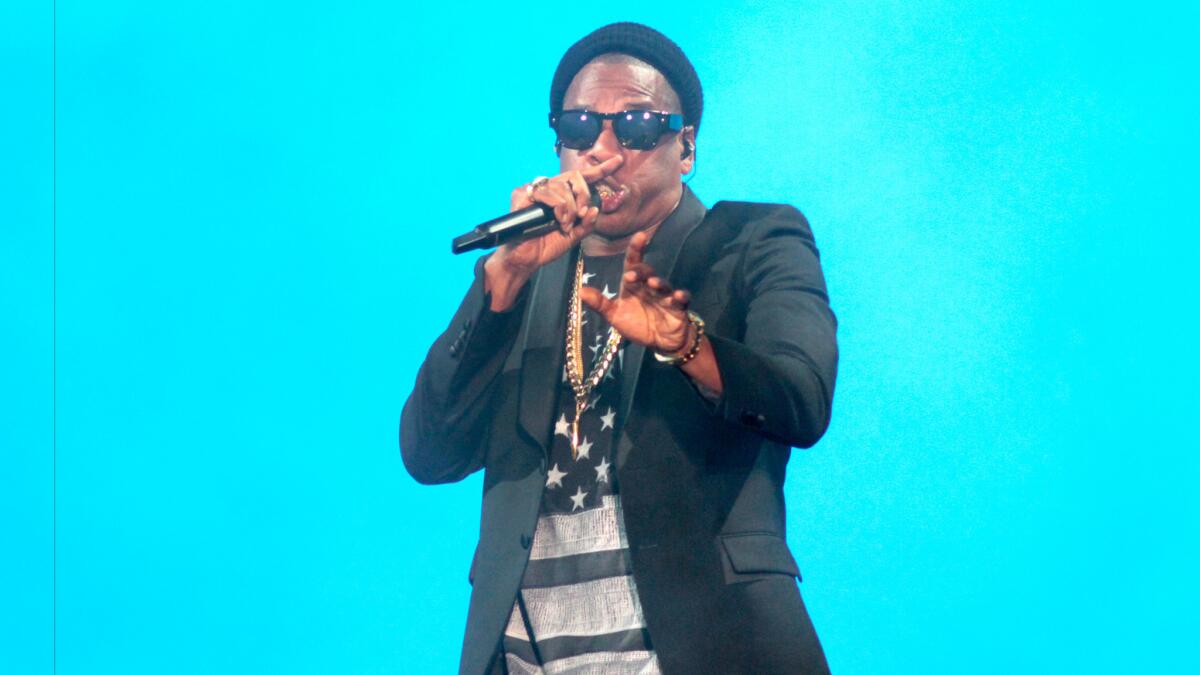Apple Music’s latest plan to defeat Spotify: Tidal exclusives?

- Share via
At least five days make music-streaming service Tidal look brilliant: July 4 of last year, Jan. 28, Feb. 15, April 23 and June 25.
The Jay Z-controlled app received a huge spike in new users each of those days, which corresponded to the release – exclusively on his service – of a major work of art.
It hasn’t added up to a gigantic customer base, just a few million subscribers. But it’s the kind of cultural influence that Apple Inc. covets.
The iPhone maker is reportedly in discussions to acquire Tidal, a deal that would combine rivals emerging from choppy starts and create a more considerable foe for Spotify, a competitor to them both. Apple and Tidal declined to comment.
The jumps in app downloads suggest that exclusives have been essential to drawing people to Tidal, which costs $20 a month for high-fidelity audio.
“Having the first run at content gets a lot of press,” said Robert Derow, head of growth strategy at Boston Consulting Group Digital Ventures. “It’s a great acquisition tactic.”
For Apple, buying Tidal would eliminate a noisy competitor and free its famous stakeholders to do exclusives with Apple instead. Tidal received music and documentaries before any other company from Lil Wayne, Rihanna, Kanye West, Beyoncé and, of course, Jay Z, because each of the artists owns a small part of the start-up.
But Apple also could maintain Tidal as is, and offer it as a higher-profit-margin premium alternative to $10-per-month Apple Music. Musicians have backed Tidal because its business model aims to be more friendly toward artists, partially because it’s the only service around that manages to extract more money out of superfans’ pocketbooks.
“It’s set up perfectly – you’ve got the right talent, you’ve got the potential for exclusives, you’ve got the right price point,” said Ty Braswell, a former Virgin Records executive whose worked on digital revenue strategies for Sony, the NHL and others.
Outside those die-hard fans, listeners largely aren’t enthusiastic about paying a monthly fee to access music online. By a 2-to-1 margin, they prefer free music with ads to ad-free subscription options, analysts at RBC Capital Markets found in a survey of U.S. consumers released Thursday. But much of the music industry doesn’t want to have anything to do with the free option because it doesn’t pay as well.
That’s forced distributors to get creative. Spotify has touted that its 30 million subscribers gain video features, the ability to listen offline and access from more devices. Apple Music has marketed the fact that it has top-notch deejays handpicking songs for its 15 million subscribers. YouTube and Amazon.com give subscribers more entertainment than just music.
But it’s often exclusives that are the game-changer, marketing experts said. In both the music and video streaming industries, online giants are putting down billions of dollars to produce or market entertainment that at least for a while legally can’t be found elsewhere.
YouTube Chief Executive Susan Wojcicki said last week that exclusive series “are one of the leading drivers of YouTube Red subscriptions,” and Amazon Video Vice President Jim Freeman told The Times that “exclusivity is a big part of what makes Prime Video even more compelling.”
No doubt, Tidal scored a coup in April with the surprise release of Beyoncé’s new album “Lemonade,” a so-called visual album that was released on the app a day before it became available on iTunes. The album may have accounted for more than 1 million new sign-ups. Tidal’s steady stream of exclusives also gives reasons to stay hooked after a free trial ends, said Derow, who led marketing initiatives for Fox and Viacom.
“Through their equity partnerships and personal relationships, they’ve been able to stem a lot of the attrition you’d normally see,” he said.
Exclusives aren’t enough to overcome a bad product though, and both Apple Music and Tidal have been dogged by usability concerns since they launched last year.
SIGN UP for the free California Inc. business newsletter >>
“If the user experience frustrates people, they will leave, and no amount of spending on marketing will fix that,” said Barry Enderwick, a former director of global marketing and subscriber acquisition at Netflix. “Buying exclusives just means you’re spending more money to acquire customers who will just end up leaving.”
The specter of a more fearsome Apple has stirred chatter in the music industry and led to other spats. Earlier this week, Spotify lashed out at Apple’s insistence that apps for the iPhone, iPod and iPad share 30% of subscription revenue with Apple. Apple’s general counsel Bruce Sewell responded a letter Friday that every app developer is expected to use the company’s payment system and Spotify wasn’t being held to any unique standard.
“We understand you want special treatment and protections from competition, but we simply will not do that,” Sewell said.
Twitter: @peard33
Times staff writer Ryan Faughnder contributed to this report.
ALSO
Court freezes Facebook’s funds in Brazil
Judge delays ruling on proposed settlement in Uber case
Driver in fatal Tesla autopilot crash was ‘very impressed’ with car’s crash-avoidance technology




